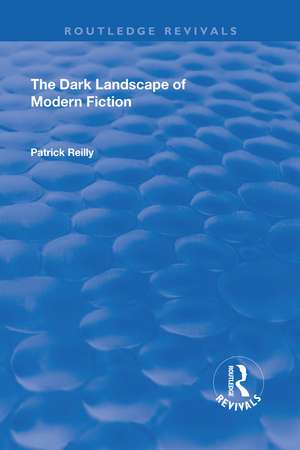The Dark Landscape of Modern Fiction
Autor Patrick Reillyen Limba Engleză Hardback – 14 dec 2017
| Toate formatele și edițiile | Preț | Express |
|---|---|---|
| Paperback (1) | 216.07 lei 6-8 săpt. | |
| Taylor & Francis – 11 noi 2019 | 216.07 lei 6-8 săpt. | |
| Hardback (1) | 456.63 lei 6-8 săpt. | |
| Taylor & Francis – 14 dec 2017 | 456.63 lei 6-8 săpt. |
Preț: 456.63 lei
Preț vechi: 590.26 lei
-23% Nou
Puncte Express: 685
Preț estimativ în valută:
87.38€ • 90.71$ • 72.87£
87.38€ • 90.71$ • 72.87£
Carte tipărită la comandă
Livrare economică 22 martie-05 aprilie
Preluare comenzi: 021 569.72.76
Specificații
ISBN-13: 9781138715318
ISBN-10: 113871531X
Pagini: 240
Dimensiuni: 152 x 229 x 21 mm
Greutate: 0.45 kg
Ediția:1
Editura: Taylor & Francis
Colecția Routledge
Locul publicării:Oxford, United Kingdom
ISBN-10: 113871531X
Pagini: 240
Dimensiuni: 152 x 229 x 21 mm
Greutate: 0.45 kg
Ediția:1
Editura: Taylor & Francis
Colecția Routledge
Locul publicării:Oxford, United Kingdom
Cuprins
Lands of darkness; Dostoyevsky; Hardy; Conrad; Wharton; Kafka; West; Camus; Waugh; O'Connor.
Descriere
This title was first published in 2003. This text explores the "dark, pessimistic truth that pervades the pages of modern texts", setting a theme of Dante's "Inferno" against the work of modern authors including Dostoyevsky, Hardy, Conrad, Wharton, Kafka, Camus, Waugh and Flannery O'Connor. The author's thesis is that these writers exhibit a hostility towards the reader, an anger that the reader should continue to be so deludedly happy when the writer has become so mortifyingly enlightened. At its most characteristic, Reilly demonstrates, modern fiction seems to achieve a savage satisfaction in inflicting this pain, to an extent that could be described as sadistic. Reilly traces what he calls this "punitive spirit" to a character in the "Inferno", Vanni Fucci, who suffering himself does his best to make Dante suffer too. Through the study he uses the "Inferno" as a guide to the prevailing attitudes in modern fiction, revealing a parallel between the prohibition of pity within the medieval poem and in the pages of modern texts.
